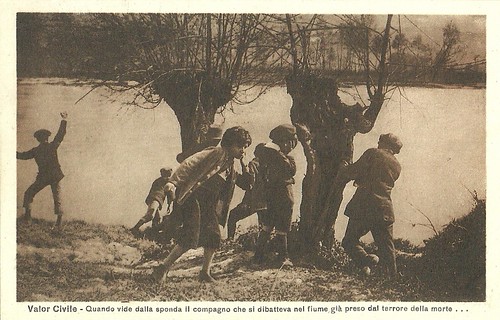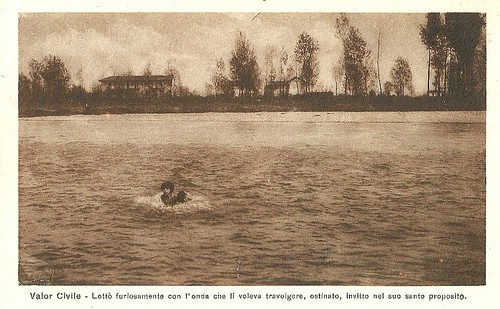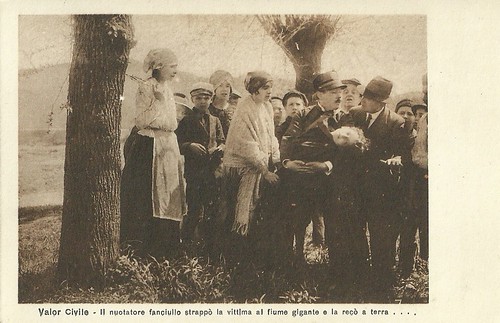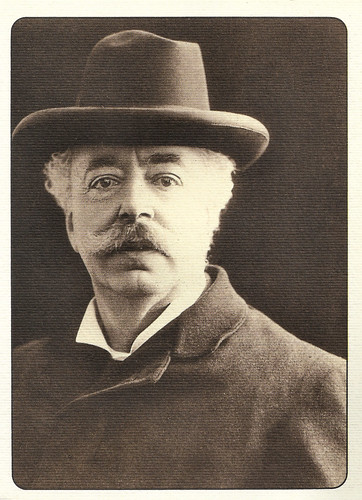In 1915-1916, the Italian company Gloria Film made a series of nine short silent films based on the stories in the book 'Cuore' (Heart) by Edmondo De Amicis. Last Friday, we did a post on the seventh film, Il piccolo patriota padovano/The little patriot from Padua (Leopoldo Carlucci, 1915). Today follows the eighth film of the series, Valor civile/Civic Value (Umberto Paradisi, 1916), again with child actor Ermanno Roveri in the lead role. Stabilimenti Alterocca in Terni published another series of postcards to promote the film. Next Friday follows a post on the ninth and final part of this film series.

Italian postcard. Alterocca, Terni. Gloria Film. Card for Valor civile/Civic Value (Umberto Paradisi, 1916). Caption: When he saw from the river bank that his friend was fighting in the river, already taken by the terror of death...

Italian postcard by Alterocca, Terni. Photo: Gloria Film. Card for Valor civile/Civic Value (Umberto Paradisi, 1916). Caption: he furiously fought with the wave that wanted to tear him down, he remained obstinate, invincible in his holy plight.
In the silent short Valor civile/Civic Value (Umberto Paradisi, 1916), Ermanno Roveri plays a Piedmont boy who risks his life to save that of a fellow (Antonio Monti) who is drowning in the river Po.
Later in the town hall, there is a solemn ceremony of handing over the medal for civil valour. And the winner is ...
Roveri and Monti had also appeared together in another short film of the Cuore series, Il piccolo scrivano fiorentino/The little scribe from Florence (Leopoldo Carlucci, 1915). Monti would also play in the diva film La Moglie di Claudio/The Wife of Claudius (Gero Zambuto, Giovanni Pastrone, 1918) starring Pina Menichelli, and a dozen other films till 1924.
In the Cuore films, the heroes are young Italian school boys who sacrifice themselves for their country and fight against the enemies at all time, even in distant wars. The Piedmont boy however survives his courageous action.
Valor civile/Civic Value (Umberto Paradisi, 1916) was again produced by Film Artistica Gloria and the cinematography was done by Giacomo Farò.

Italian postcard by Alterocca, Terni. Photo: Gloria Film. Card for Valor civile/Civic Value (Umberto Paradisi 1916). Caption: The young swimmer liberated the victim from the giant river and brought him to the river's edge.

Italian postcard by Alterocca, Terni. Photo: Gloria Film. Card for Valor civile/Civic Value (Umberto Paradisi 1916). Caption: ... and a boy of eight or nine years old, pushed forward by a woman, threw himself on the decorated one.

Edmondo de Amicis. Italian postcard by Intermail, Bergamo. Photo: Bompiani, Sonzogno. Italian author Edmondo de Amicis (1846-1908) was the author of the 1886 children's novel Cuore (Heart). De Amicis was a novelist, journalist, short story writer, and poet. Cuore is his best known work to this day, having been inspired by his own children Furio and Ugo who had been schoolboys at the time. It is set during the Italian unification, and includes several patriotic themes. It was issued by Treves on 18 October 1886, the first day of school in Italy, and rose to immediate success.
Edmondo de Amicis wrote Cuore in a diary form as told by Enrico Bottini, an 11-year-old primary school student in Turin with an upper class background who is surrounded by classmates of working class origin. The entire chronological setting corresponds to the third-grade season of 1881-1882. Enrico says it has been four years since death of Victor Emmanuel II, king of Italy, and the succession by Umberto I, and also tells about the death of Giuseppe Garibaldi, which happened in 1882. Enrico's parents and older sister Silvia interact with him as written in his diary. As well as his teacher who assigns him with homework that deals with several different stories of children throughout the Italian states who should be seen as role models – these stories are then given in the book as Enrico comes upon reading them. Every story revolves around a different moral value, the most prominent of which are helping those in need, having great love and respect for family and friends, and patriotism. These are called 'The Monthly Stories' and appear at the end of every school month.
Sources: Film Affinity and IMDb. For the full film, see Europeana.eu.

Italian postcard. Alterocca, Terni. Gloria Film. Card for Valor civile/Civic Value (Umberto Paradisi, 1916). Caption: When he saw from the river bank that his friend was fighting in the river, already taken by the terror of death...

Italian postcard by Alterocca, Terni. Photo: Gloria Film. Card for Valor civile/Civic Value (Umberto Paradisi, 1916). Caption: he furiously fought with the wave that wanted to tear him down, he remained obstinate, invincible in his holy plight.
Risking his life to save that of a fellow
In the silent short Valor civile/Civic Value (Umberto Paradisi, 1916), Ermanno Roveri plays a Piedmont boy who risks his life to save that of a fellow (Antonio Monti) who is drowning in the river Po.
Later in the town hall, there is a solemn ceremony of handing over the medal for civil valour. And the winner is ...
Roveri and Monti had also appeared together in another short film of the Cuore series, Il piccolo scrivano fiorentino/The little scribe from Florence (Leopoldo Carlucci, 1915). Monti would also play in the diva film La Moglie di Claudio/The Wife of Claudius (Gero Zambuto, Giovanni Pastrone, 1918) starring Pina Menichelli, and a dozen other films till 1924.
In the Cuore films, the heroes are young Italian school boys who sacrifice themselves for their country and fight against the enemies at all time, even in distant wars. The Piedmont boy however survives his courageous action.
Valor civile/Civic Value (Umberto Paradisi, 1916) was again produced by Film Artistica Gloria and the cinematography was done by Giacomo Farò.

Italian postcard by Alterocca, Terni. Photo: Gloria Film. Card for Valor civile/Civic Value (Umberto Paradisi 1916). Caption: The young swimmer liberated the victim from the giant river and brought him to the river's edge.

Italian postcard by Alterocca, Terni. Photo: Gloria Film. Card for Valor civile/Civic Value (Umberto Paradisi 1916). Caption: ... and a boy of eight or nine years old, pushed forward by a woman, threw himself on the decorated one.
Inspired by his own children

Edmondo de Amicis. Italian postcard by Intermail, Bergamo. Photo: Bompiani, Sonzogno. Italian author Edmondo de Amicis (1846-1908) was the author of the 1886 children's novel Cuore (Heart). De Amicis was a novelist, journalist, short story writer, and poet. Cuore is his best known work to this day, having been inspired by his own children Furio and Ugo who had been schoolboys at the time. It is set during the Italian unification, and includes several patriotic themes. It was issued by Treves on 18 October 1886, the first day of school in Italy, and rose to immediate success.
Edmondo de Amicis wrote Cuore in a diary form as told by Enrico Bottini, an 11-year-old primary school student in Turin with an upper class background who is surrounded by classmates of working class origin. The entire chronological setting corresponds to the third-grade season of 1881-1882. Enrico says it has been four years since death of Victor Emmanuel II, king of Italy, and the succession by Umberto I, and also tells about the death of Giuseppe Garibaldi, which happened in 1882. Enrico's parents and older sister Silvia interact with him as written in his diary. As well as his teacher who assigns him with homework that deals with several different stories of children throughout the Italian states who should be seen as role models – these stories are then given in the book as Enrico comes upon reading them. Every story revolves around a different moral value, the most prominent of which are helping those in need, having great love and respect for family and friends, and patriotism. These are called 'The Monthly Stories' and appear at the end of every school month.
Sources: Film Affinity and IMDb. For the full film, see Europeana.eu.
No comments:
Post a Comment